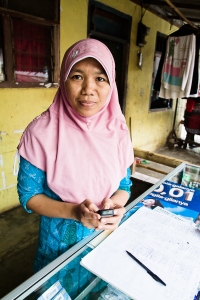A simple and widely available tool – the mobile phone – is creating substantial impact in the developing world, changing the lives of low-income individuals, especially in rural communities. Today, 6 billion mobile phones are being used throughout the world, with approximately 75 percent of users living in developing countries.

In Indonesia, “mobile microentrepreneurs” are already helping other poor people in their community find jobs and get information on market prices for their goods.
Recognizing the opportunity offered by this technology, Grameen Foundation and eBay Foundation began working together this summer to build solutions that address market challenges facing microentrepreneurs in Indonesia. Our joint effort will support Grameen Foundation’s Mobile Microfranchise initiative, which currently works with a network of more than 10,000 women microentrepreneurs, heavily concentrated in the West Java region.
This network, which is managed by Ruma – a social enterprise that Grameen Foundation helped to incubate and grow – currently reaches more than 1 million customers.
In this piece on The Huffington Post, Alex Counts, President and CEO of Grameen Foundation, and Lauren Moore, Head of Global Social Innovation for eBay Inc., and President of eBay Foundation, discuss our new collaboration.




